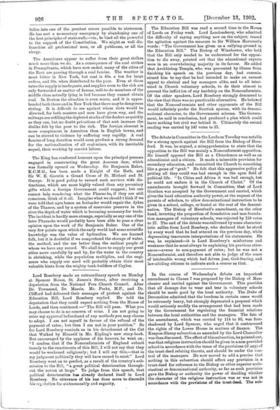The Education Bill was read a second time in the
House of Lords on Friday week. Lord Londonderry, who admitted the difficulty of saying anything new on the subject, traced the agitation against the measure to Sir William Harcourt's words : "The Government has given us a rallying-ground in the Education Bill." The Bishop of Winchester, who held that the Bill only needed to be understood for the opposi- tion to die away, pointed ont that the educational experts were in an overwhelming majority in its favour. He added that Archbishop Temple, who was prevented by illness from finishing his speech on the previous day, had commis- sioned him to say that he had intended to make an earnest appeal to clerical and lay managers alike, and to all inter- ested in Church voluntary schools, to do their utmost to prevent the inflict ion of any hardship on the Nonconformists. Of the other speakers, Lord Rosebery strongly demurred to the view that there was no practicable alternative. He befieaed that the Nonconformists and other opponents of the Bill would infinitely prefer the Scottish system, with its denomi- national character, to the Government scheme. The Govern- ment, he said in conclusion, had produced a plan which could leave nothing but civil war behind it. Ultimately the second reading was carried by 147 votes to 37.


















































 Previous page
Previous page